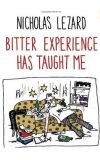
17 Jul 2013 01:33:37
The book is essentially a collection of 850-word pieces, with occasional chapter divisions that seem to be there for the sake of appearance rather than of thematic function. So it is a good thing that Lezard is such an entertaining companion. Fancy reading about the day he bought a toaster? It's the way he tells it.
There is a narrative arc, of sorts. After 19 years of marriage, Lezard's wife and mother of his three children – he had written about fatherhood in a Guardian column called Slack Dad – kicks him out. He fetches up at what he names the Hovel, which occupies three floors of an 1850 house near London's Baker Street. The floors slope in various directions: in the kitchen, a fried egg pools at the edge of the pan in the shape of a crescent moon. The wallpaper is peeling and the furniture is tatty and uncomfortable. The room that will become Lezard's bedroom features a sofa bed, a bare overhead bulb and a bare standard lamp, a Kandinsky print and a newspaper photo glued on to card, and a bookshelf containing a single volume.
"It is the saddest place I have ever seen," he writes. Here, he settles down with his bachelor friend Razors, and later with two young women flatmates. He falls in love, but – this may be a plot spoiler, but you will not read the book for the plot – gets dumped. After another low point, he comes to a bruised resignation.
Part of the appeal of a memoir such as this is the vicarious experience of a life that you do not have to live yourself. Lezard reverts to studenthood, paying rent, doing no more than rudimentary housework, getting up late, drinking enthusiastically – he is a little defensive about his bottle-an-evening consumption and tries to cut down at one point. He smokes, all sorts evidently. He is incapable of filling in a tax return. He is broke, but as a freelance book reviewer is able to keep his own hours and to enjoy perks such as lunches with his agent and publisher, along with invitations to parties. It is appealing, in a way. But it is less appealing when you consider the banishment from a family home and the absences from his children, about whom he writes touchingly, and when you consider that Lezard is in his late 40s as the book opens.
Lezard does not try to make himself appear nicer than he is: an excellent quality in a memoirist, as authors including Jeffrey Bernard and Alan Clark have demonstrated. He is, nevertheless, companionable. His prose can include references ranging from Beckett to Buffy, and Santayana to Snoopy, without showing off. He is very funny, turning in memorably comic pieces about the previously mentioned toaster and sofa-moving, and about the hallucinatory after-effects of some herbal virility pills – "I dreamed I was, I promise you, trying to buy a pipe while being menaced by panthers. Analyse that one, Doctor Freud." Bitter Experience Has Taught Me is not a proper book, but you probably won't care.

